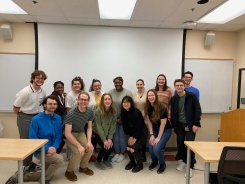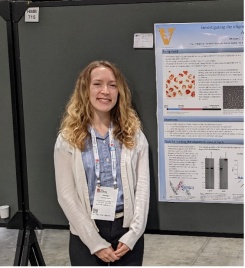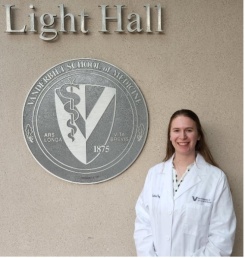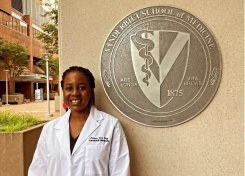We are a group of faculty and first year graduate students who are embarking on a travel expedition into the microbial world. Check this site for a description of what we learn and see along the journey. You can also follow us on Twitter! @ClassMicro
We welcome your constructive feedback!
Please Come Back and Degrade This for Me
Georgia C.
February 20, 2023
When humans engineered synthetic polymers that were virtually impossible to break down, we thought we’d achieved a major victory over the pesky microbes that were shortening the shelf lives of our favorite products. But sometimes winning a fight leads to a whole host of unexpected consequences: in this case, an unmanaged plastic waste crisis threatening the health of humans and the planet we live on.
The Bacterial Assassin and its Tool Kit
Jessica Day
February 19, 2023
Midway through our journey through the microbial world, Dr. Maria Hadjifrangiskou joined the class on February 3rd, 2023, to narrate a portion of our tour “Warzone Travel: Bacterial Fight Club.” In this session Dr. Hadjifrangiskou discussed the amazing ability of some bacteria to shoot protein daggers into other cells as a form of attack or defense.
Fleaing the Plague
Emma Peacock
February 12, 2023
Vincent Racaniello, Elio Schaechter, Michele Swanson, and Michael Schmidt hosted episode 255 of the podcast “This Week in Microbiology” entitled "Fleaing the Plague.” During the episode, they discussed two papers published in late 2021. The first paper by Kehe et al.
Staphylococcus aureus & Candida albicans Polymicrobial Infection Makes Virulence A Bigger Problem
Alex Blatt
February 6, 2023
Todd OA, Fidel PL Jr, Harro JM, Hilliard JJ, Tkaczyk C, Sellman BR, Noverr MC, Peters BM. Candida albicans Augments Staphylococcus aureus Virulence by Engaging the Staphylococcal agr Quorum Sensing System. mBio. 2019 Jun 4;10(3):e00910-19. doi: 10.1128/mBio.00910-19. PMID: 31164467; PMCID: PMC6550526.
Lavender and Catheters
Erykah Coe
February 5, 2023
In Episode 263 of the This Week in Microbiology Podcast, the hosts discussed the recent findings of two 2022 papers.
Broadening the Microbiome: Fungi in Inflammatory Bowel Diseases (IBD)
Tina C.
March 7, 2022
https://asm.org/Articles/2021/July/Broadening-the-Microbiome-Fungi-in-Inflammatory-Bo
I recently read a blog post by Christy Clutter that discusses the role of fungi in Inflammatory bowel disease (IBD). IBD is characterized by immune hyperactivation that damages the intestine of about 3 million Americans, and includes Crohn’s disease and ulcerative colitis. Although 240 genetic variations associated with increased likelihood of IBD development have been identified, epidemiological studies show that strong environmental factors such as diet, antibiotic exposure, and smoking can affect individual susceptibility.
Evolution of a Protective Symbiont in Honey Bees by Professor Irene Newton, PhD
Monique Porter
March 3, 2022
Speaker Background: Dr. Irene Newton, PhD, specializes in mechanisms of symbiosis; specifically, the molecular mechanisms of host-microbe symbiotic interactions. She obtained her PhD from Harvard University and conducted postdoctoral research at Tufts University. She is currently an associate professor at Indiana University.
Can Gut Microbes Cause Cancer?
Amelia Cephas
March 2, 2022
The Western-style diet is chock full of high fat, processed and refined foods that often cause systemic damage to the human body. One particular effect that high fat foods have on the body involves the microbes in the gastrointestinal tract. Many studies have shown the association between the colonization of a subset of microbes in the gut and colorectal and gastric cancer onset.









